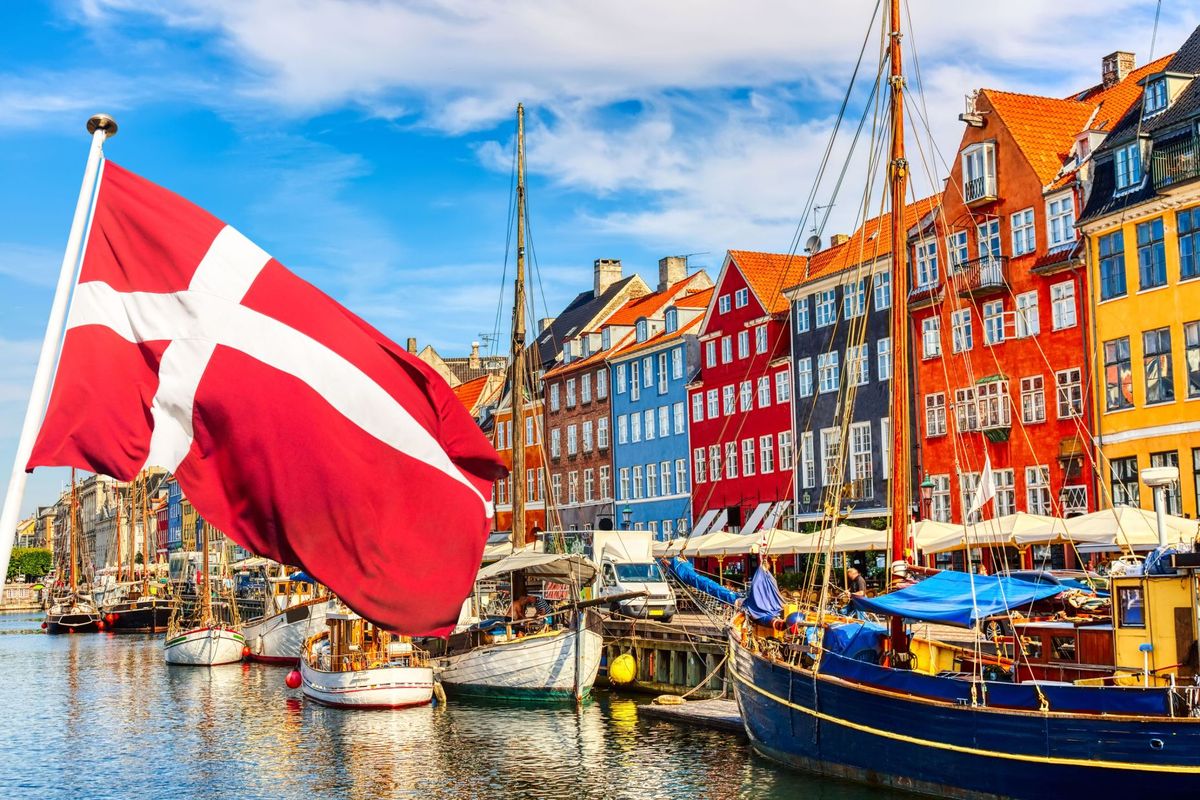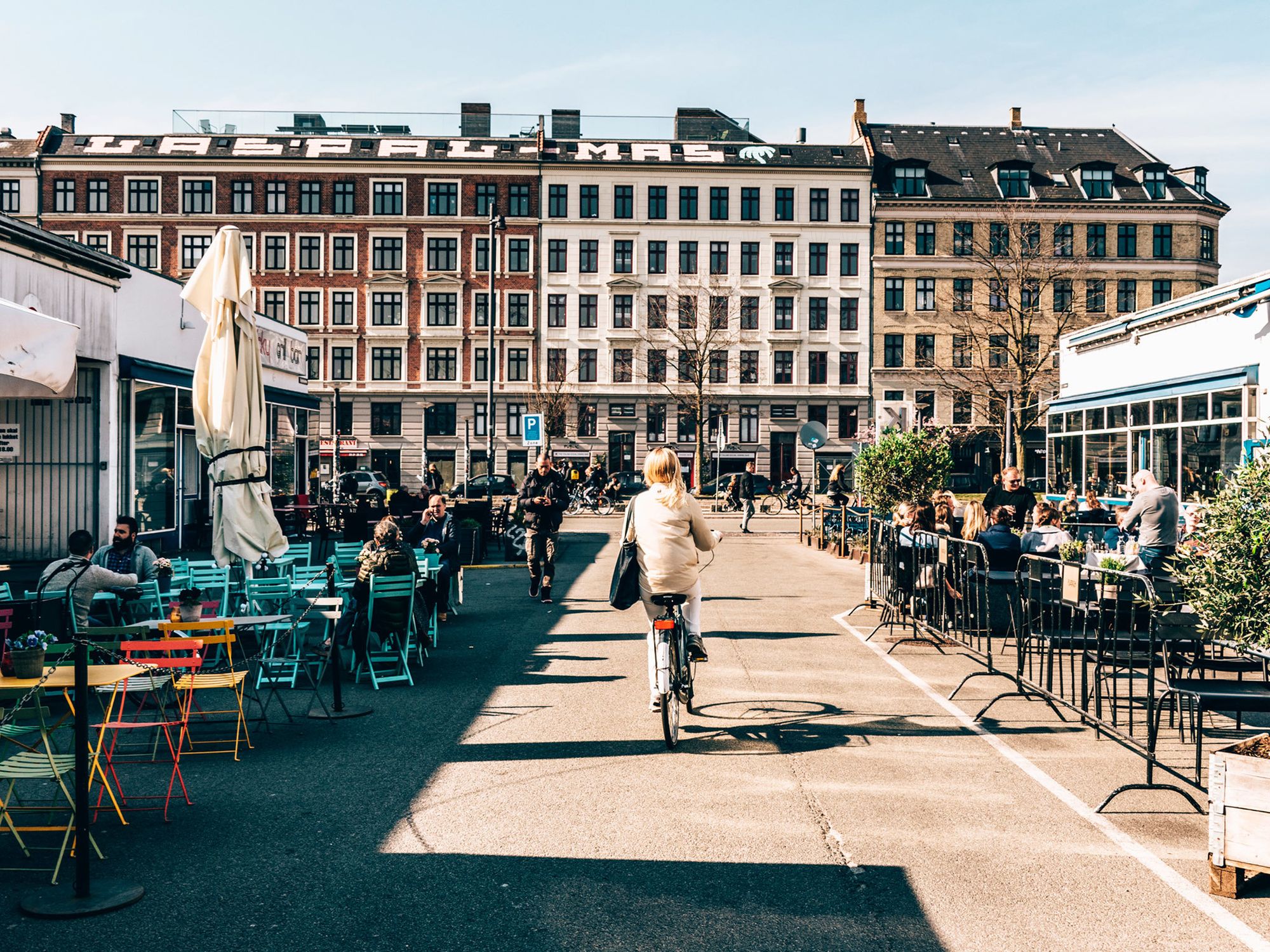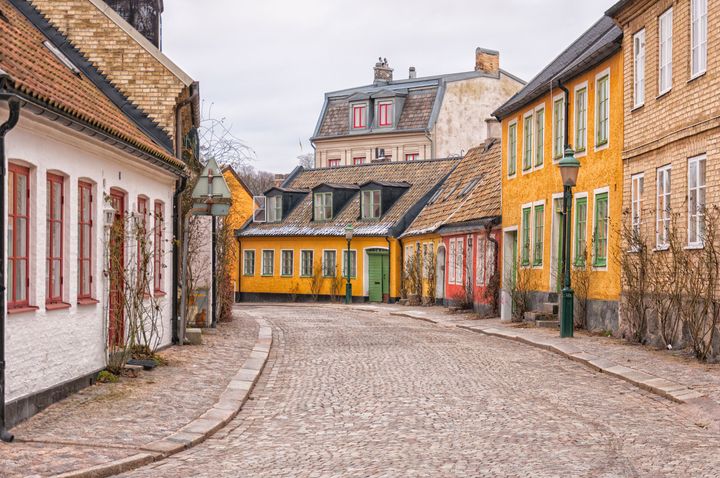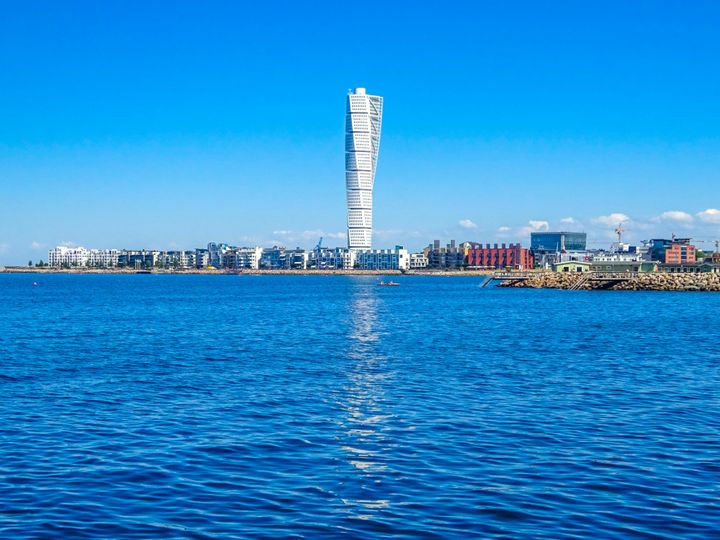Everything About Moving to Copenhagen, Denmark: A Guide for International Students
In this guide, you will find all the information you need to plan your move, including tips on finding accommodation, getting around the city, and making the most of your time in Copenhagen.

So you're gearing up to make the move to one of Scandinavia's most vibrant capitals: Copenhagen, Denmark! Relocating to a new city, particularly one abroad, can certainly feel overwhelming, but fear not—we're here to assist in making your transition to life in Copenhagen as seamless as possible. In this guide, you’ll discover all the essentials needed to plan your move effectively, including advice on securing accommodation, navigating the city, and maximizing your stay in Copenhagen.
Copenhagen, the Danish capital, is famed for its striking blend of historical charm and modern design, featuring picturesque canals, grand old palaces, and cutting-edge architecture. With a population of about 630,000, Copenhagen offers a cosmopolitan atmosphere combined with a cozy, small-town feel, making it an ideal place for international students to live, learn, and explore.
Home to several world-renowned universities, including the University of Copenhagen, the city is a hub of academic excellence and innovation. These institutions are celebrated for their research achievements and diverse international communities, drawing students from across the globe. The universities' commitment to high-quality, research-based education makes Copenhagen a top choice for those seeking an enriching academic experience.
Whether you're arriving to study for a few months or to embark on a full degree, this guide aims to help you make the most of your time in this stunning city. By the end of this guide, you should have the answers to all your pressing questions about life in Copenhagen.
- How can I move to Copenhagen, Denmark as a student?
- What is the cost of living with roommates in Copenhagen?
- What are the best neighborhoods to live with roommates in Copenhagen?
- How do I find shared accommodation in Copenhagen?
- How can I find roommates in Copenhagen?
- What steps should I take to move into a student-friendly place in Copenhagen?
- What are the best ways to get around Copenhagen?
- What are some popular attractions and things to do with your roommates in Copenhagen?
- What are some cultural differences I should be aware of when living in Copenhagen?
- What type of housing options are available in Copenhagen?
- How can I find information about student life in Copenhagen?
- What are the most important do’s and don’ts of moving to Copenhagen as a student?
What makes Copenhagen a good place for international students?
Copenhagen stands out as an ideal city for international students due to its unique blend of cultural richness and educational opportunities. The city boasts a high-quality life with a robust public transportation system that makes it easy to explore.
Copenhagen's educational institutions are renowned for their global outlook and innovation, which attract students worldwide. The University of Copenhagen, along with other institutions, offers a variety of programs taught in English, accommodating a diverse student body.
Additionally, Copenhagen's safety, coupled with a vibrant nightlife and abundant green spaces, provides a balanced environment for both study and leisure. The city's commitment to sustainability is evident in its many eco-friendly initiatives, aligning with the values of today's environmentally conscious youth. Overall, Copenhagen provides a supportive and stimulating environment that fosters educational and personal growth for students from all corners of the globe.
How can I move to Copenhagen, Denmark as a student?
To move to Copenhagen as an international student, start by securing admission to a Danish educational institution. Once admitted, apply for a residence permit, which requires proof of admission, financial self-sufficiency, and in some cases, health insurance. Copenhagen universities often assist with the permit process.
Next, arrange your accommodation. Universities may offer help, but also explore private rentals or student housing through other platforms. If you're looking for shared accommodation in Copenhagen, fret not! Check out listings all over Denmark and get matched with compatible roommates through Hemavi.
Upon arrival in Denmark, register with the Civil Registration System (CPR) to obtain a Danish personal identification number, which is crucial for accessing public services, including healthcare. Additionally, set up a local bank account and familiarize yourself with public transport and cycling routes, the most common ways to navigate the city. Finally, immerse yourself in Danish culture and language through community classes or university offerings to ease your integration.
For more information on moving to Copenhagen as a student, visit Study in Denmark's official site here.
What is the cost of living with roommates in Copenhagen?
Sharing an apartment with roommates is an affordable way to live in Copenhagen, as it reduces the cost of rent and utilities. The cost of living in Copenhagen greatly varies depending on the apartment you're renting, how much you're spending on utilities and groceries, and other aspects such as your transportation. Here are some ways you can manage your budget:
- Take advantage of the city's extensive bike lanes by cycling, an economical and healthy way to commute.
- For groceries, shop at budget-friendly supermarkets like Netto, Lidl, or Aldi, and consider visiting local markets for fresh produce at lower prices towards closing time. Cooking at home can significantly reduce expenses compared to dining out.
- Utilize student discounts available on entertainment and transport, and explore the city's numerous free parks, museums with free admission days, and public events. Consider buying a Copenhagen Card if you plan frequent visits to attractions, as it offers considerable savings.
- Networking with other students can lead to shared tips on deals and affordable living options, enhancing your experience while keeping costs down.

What are the best neighborhoods to live in with roommates in Copenhagen?
Finding the right neighborhood in Copenhagen to live with roommates involves considering both lifestyle preferences and budget. For students and young professionals, areas like Nørrebro and Vesterbro are popular choices, offering vibrant nightlife, diverse dining options, and cultural activities, all conducive to a social lifestyle. These neighborhoods are teeming with cafes, bars, and shops, making them ideal for those looking to immerse themselves in Copenhagen's bustling urban life.
For a quieter, more residential experience, consider Østerbro or Frederiksberg. These areas are known for their green spaces, such as Fælledparken and Frederiksberg Gardens, providing a more laid-back atmosphere while still maintaining accessibility to central Copenhagen.
Shared accommodation in these neighborhoods not only helps in managing living costs but also provides a communal setting for making new friends and cultural exchange. To explore more about the best neighborhoods in Copenhagen for living with roommates, you can read the full guide here.
How do I find shared accommodation in Copenhagen?
Finding shared accommodation in Copenhagen as a student involves several steps to ensure you find a suitable place to live. Start by exploring popular online platforms, which list numerous rental options including rooms in shared apartments. Facebook groups dedicated to housing in Copenhagen are also valuable resources for connecting directly with potential roommates or landlords.
It's important to start your search early, especially before the start of the academic year when demand is highest. Be prepared to show your credentials as a reliable tenant, including a student ID or admission letter, and possibly references from previous landlords.
When considering different neighborhoods, Nørrebro and Vesterbro are ideal for students seeking vibrant urban life, while Frederiksberg offers a quieter, more residential setting. Always visit potential accommodations in person to assess their condition and suitability for your needs.
If you're looking for shared accommodation in Copenhagen, we've got you! Check out listings all over Denmark and get matched with compatible roommates through Hemavi.
How can I find roommates in Copenhagen?
In general, finding accommodation in Copenhagen is a bit of a daunting task, given the city's popularity among students and the discrepancy between supply and demand when it comes to student housing. Beyond finding a place to call home, you also need to consider the people you'll be living with.
Finding roommates in Copenhagen can be streamlined by using a variety of online resources and local networks. Here are some effective ways to start your search:
- Online Platforms: Websites like Hemavi are popular for finding shared accommodations and potential roommates. These platforms allow you to filter searches by area, budget, and preferences.
- Social Media: Join Facebook groups such as "Lejligheder i København" or "Roommates in Copenhagen". These groups are active with daily postings and are a great place to connect directly with people looking for roommates.
- University Networks: Check if your university has a bulletin board, online forums, or social groups for students seeking shared housing. For example, the University of Copenhagen and Copenhagen Business School have resources for incoming students.
- Expatriate Forums: Websites like Internations or Expat.com offer community advice and resources where you can find others in similar situations.
- Notice Boards: Look for notice boards in local cafes, libraries, or community centers in popular student areas like Nørrebro and Vesterbro.

What steps should I take to move into a student-friendly place in Copenhagen?
Moving to a new city as a student can be both exciting and scary. Copenhagen is a popular destination for international students, but finding suitable accommodation can be a challenge. Here are some steps you can take:
- Research Accommodation Options: Start by identifying the most student-friendly neighborhoods, which are popular for their proximity to universities, vibrant cultural scenes, and relative affordability. Use online resources to explore available listings.
- Set a Budget: Determine your budget, considering not only rent but also utilities, transportation costs, and other living expenses. Copenhagen can be expensive, so planning your finances is crucial.
- Check University Resources: Many universities in Copenhagen offer resources to help students find housing. For instance, the University of Copenhagen provides a 'Housing Foundation' specifically to assist international students.
- Visit the Property: If possible, visit the property in person to check its condition, the neighborhood, and transport links. If you’re abroad, try to get a virtual tour.
- Understand the Lease Agreement: Before signing the lease, understand all its terms, including the rent, deposit, duration, and rules about subletting or having roommates.
- Register for a CPR Number: Once you’ve secured a place, register for a CPR number at the local Civil Registration Office. This is essential for accessing healthcare, signing up for a Danish bank account, and other administrative purposes.
- Connect with Roommates: If you're sharing accommodation, connect with your roommates before moving in. This can help set expectations and start your co-living arrangement on a positive note.
- Plan Your Move: Organize the logistics of your move, including packing, booking transport, and setting up utilities if they’re not included in the rent.
What do I do if I can't find suitable accommodation in Copenhagen?
Copenhagen, Denmark's picturesque capital, is not only renowned for its canals and cycling culture but also as a prime destination for students globally. However, finding housing here can be as daunting as it is thrilling, with over 60% of students facing challenges due to high demand and limited availability, especially at the start of the academic year.
In this context, exploring alternative housing options beyond traditional dorms and shared apartments is vital. If you're unable to find accommodation in Copenhagen, nearby cities and towns like Lyngby, Roskilde, Hvidovre, Rødovre, Ballerup, and Herlev, as well as Malmö in Sweden can be worth checking out. These areas offer more affordable housing options and are well-connected to Copenhagen, making them practical choices for students.
Additionally, housing foundations such as the University of Copenhagen Housing Foundation and KKIK play a crucial role in aiding students to find suitable accommodations. They provide a variety of housing options, prioritizing international students and those from remote regions.
Youth hostels also offer a flexible and economical solution for students. Many hostels in Copenhagen provide long-term rates that include utilities, and facilities like communal kitchens and social events, which can help new students settle in and meet new people.
What are the best ways to get around Copenhagen?
As a student in Copenhagen, you'll find commuting surprisingly easy due to the city's efficient transport network. Over half of the locals use bikes daily, and the public transport system enjoys a 92% approval rate among students.
The city's transport network includes the Metro, which operates 24/7 and features several lines that connect major areas including universities and cultural sites. The M1 and M2 lines link important neighborhoods and even the airport, while the M3 and M4 lines circle around central Copenhagen. The city's buses and regional trains further enhance connectivity, especially for reaching suburbs or areas not directly served by the Metro. Night buses ensure that transportation is available at all hours, which is particularly beneficial for students studying late or participating in the city's vibrant nightlife.
For students, the Youth Card provides discounted travel across various modes of transport, enhancing affordability and flexibility. This card is especially beneficial for regular commuters, offering a cost-effective solution for navigating the city.

What are some popular attractions and things to do with your roommates in Copenhagen?
Copenhagen, Denmark offers a range of exciting activities and attractions for roommates to enjoy, including:
- Tivoli Gardens, one of the world's oldest amusement parks, opened in 1843 in Copenhagen, Denmark. It is celebrated for its blend of historical charm and modern attractions, including roller coasters, live performances, and beautiful gardens.
- Nyhavn, originally a busy commercial port, is now a vibrant waterfront area known for its colorful 17th-century townhouses and lively atmosphere. This district is popular for its restaurants, cafes, and the canal tours that offer scenic views of Copenhagen.
- Freetown Christiania is an autonomous neighborhood established in 1971 on a former military base. It's known for its counterculture, community living, and vibrant street art.
- Rosenborg Castle, built in the early 17th century by King Christian IV, is a royal palace set within the King's Garden. It houses the Crown Jewels and royal artifacts, and is a key cultural landmark in Copenhagen.
- The Round Tower (Rundetaarn), completed in 1642, serves as Europe's oldest functioning observatory. It offers panoramic views of the city and features a unique helical ramp for easy ascent.
- Copenhagen Street Food on Refshaleøen (Reffen), a vibrant food market, offers a taste of local and international cuisines, promoting sustainability and community engagement. It’s a bustling spot where food, culture, and entertainment come together against the backdrop of Copenhagen’s waterfront.
- Copenhagen Zoo is home to a diverse array of species and is particularly noted for its commitment to animal welfare and conservation. Interactive exhibits like the Arctic Ring highlight its role in educating the public on environmental preservation.
- The Copenhagen Opera House, a stunning example of modern architecture, provides a rich cultural experience with its superior acoustics and a wide array of performances ranging from opera to ballet.
- Carlsberg Brewery, where visitors can explore the history of one of Denmark’s iconic beers, offers tours that include tastings and an insight into the brewing process.
- The Botanical Garden, part of the Natural History Museum of Denmark, is a green oasis in the heart of the city with extensive collections of plants and historic greenhouses, offering a peaceful retreat and educational opportunities about biodiversity.
What are some cultural differences I should be aware of when living in Copenhagen?
Relocating to Copenhagen as an international student offers a gateway to diverse cultural experiences and educational opportunities. Each year, Copenhagen welcomes approximately 13,000 international students, ensuring you're in good company in this adventure. Understanding local cultural nuances is crucial as you integrate into this vibrant city. Danish culture is characterized by direct communication where honesty and transparency are valued. For example, Danes are straightforward in their feedback, which can appear blunt but is meant to foster trust and improvement. Privacy is highly respected, so public interactions may seem reserved. However, Danes are friendly and helpful when approached with respect.
The Law of Jante, emphasizing modesty and equality, plays a significant role in social interactions, discouraging boastfulness and promoting a humble expression of one's achievements. The educational environment in Denmark is informal and promotes open dialogue between students and professors, encouraging active participation and self-directed learning.
Danes prioritize work-life balance, reflected in university schedules that accommodate personal well-being. Social life in Copenhagen includes tight-knit circles where forming new friendships might take time, but involvement in student organizations and clubs can facilitate this process. The concept of hygge, central to Danish social life, emphasizes coziness and relaxation, often enjoyed in intimate gatherings.
What type of housing options are available in Copenhagen?
Copenhagen, Denmark's capital, is renowned for its vibrant culture, historic architecture, and robust educational institutions, making it a prime destination for international students. In Copenhagen, shared accommodation is a popular housing option that offers several benefits.
Shared accommodation, such as living in shared apartments or houses, allows students to split costs for rent, utilities, and other living expenses. This arrangement is particularly cost-effective in a city like Copenhagen, where housing can be expensive. Beyond the financial advantages, shared living provides an excellent platform for socialization. Students have the opportunity to build networks, forge new friendships, and create lasting memories in a supportive living environment.
Living with roommates also facilitates cultural exchange. Students from various backgrounds share their traditions, languages, and perspectives, enriching each other’s cultural understanding. This diversity enhances daily life and contributes to a broader, global perspective during one’s studies.
When choosing shared accommodation in Copenhagen, students should consider several factors to find the best fit. Location is crucial; proximity to university campuses and city amenities can significantly enhance convenience. Students should also evaluate the cost, available amenities, and the potential for compatibility with roommates. Ensuring a good match in living styles and interests can greatly influence one's comfort and overall experience in shared housing.
How can I find information about student life in Copenhagen?
If you're an international student studying in Copenhagen, adapting to student life in Denmark can be both exciting and challenging. Familiarizing yourself with the Danish education system, securing suitable accommodation, managing your finances, and engaging in campus activities are crucial steps to making the most of your educational journey.
Copenhagen is bustling with events and activities tailored for students, offering ample opportunities to immerse yourself in local culture and student life. To stay informed and get involved, consider exploring these resources:
- University websites for academic and extracurricular information
- Orientation programs designed for international students
- Student unions that provide support and organize events
- Student ambassador programs to connect with peers
- Official city websites for local news and events
- Various social media platforms for real-time updates
Connecting with both local and international students can greatly enhance your sense of belonging. By taking initiative, remaining open to new experiences, and seeking support when necessary, your time in Copenhagen can be both enriching and memorable.
What are the most important do’s and don’ts of moving to Copenhagen as a student?
If you're an international student gearing up for life in Copenhagen, prepare for an exhilarating journey filled with both excitement and some natural anxiety. Transitioning to life in this vibrant city is significant, but with the right guidance, you can navigate it smoothly.
To make your transition smoother, here are some do's:
- Register with Local Authorities: Immediately register to obtain your Civil Registration System (CPR) number, crucial for accessing healthcare, financial services, and public benefits.
- Get a Bike: Embrace Copenhagen's cycling culture for efficient and eco-friendly transportation.
- Explore Housing Early: Start your housing search early to find the best options, from student halls to shared apartments.
- Learn Some Danish: While most Danes speak English, learning the local language can enhance your cultural experience and interactions.
- Prepare for the Weather: Invest in a good waterproof jacket and understand the city's unpredictable, often rainy climate.
As for the don'ts:
- Ignore Local Customs: Respect local laws and customs, especially in public spaces and while cycling.
- Underestimate Costs: Plan your finances wisely, considering Copenhagen's high living costs and seeking out student discounts.
- Skip Orientation Programs: These programs are key to understanding your new academic environment and meeting fellow students.
- Stay Within Your Comfort Zone: Engage with local students and participate in community activities to enrich your experience.
- Neglect Health Insurance: Ensure you have appropriate health coverage to avoid unexpected medical expenses.
We hope our comprehensive guide about moving to Copenhagen, Denmark has given you all the information you need to take the leap and move to this beautiful Scandinavian city. By now, you should have an understanding of why Copenhagen is the perfect place for a student to live, the steps you need to take to move there, the general cost of living and the process of finding a roommate.
One of the biggest obstacles students face when deciding to move is financing, as Copenhagen is relatively expensive when compared to the rest of Europe. Our number one advice to tackle this? Get a roommate! Living with roommates is an excellent way to reduce costs and make friends as soon as you move.
If you're moving to Copenhagen and still looking for a place, or if you've found a place but need a roommate you'll get along with, learn more about the services we offer at Hemavi.




Comments ()